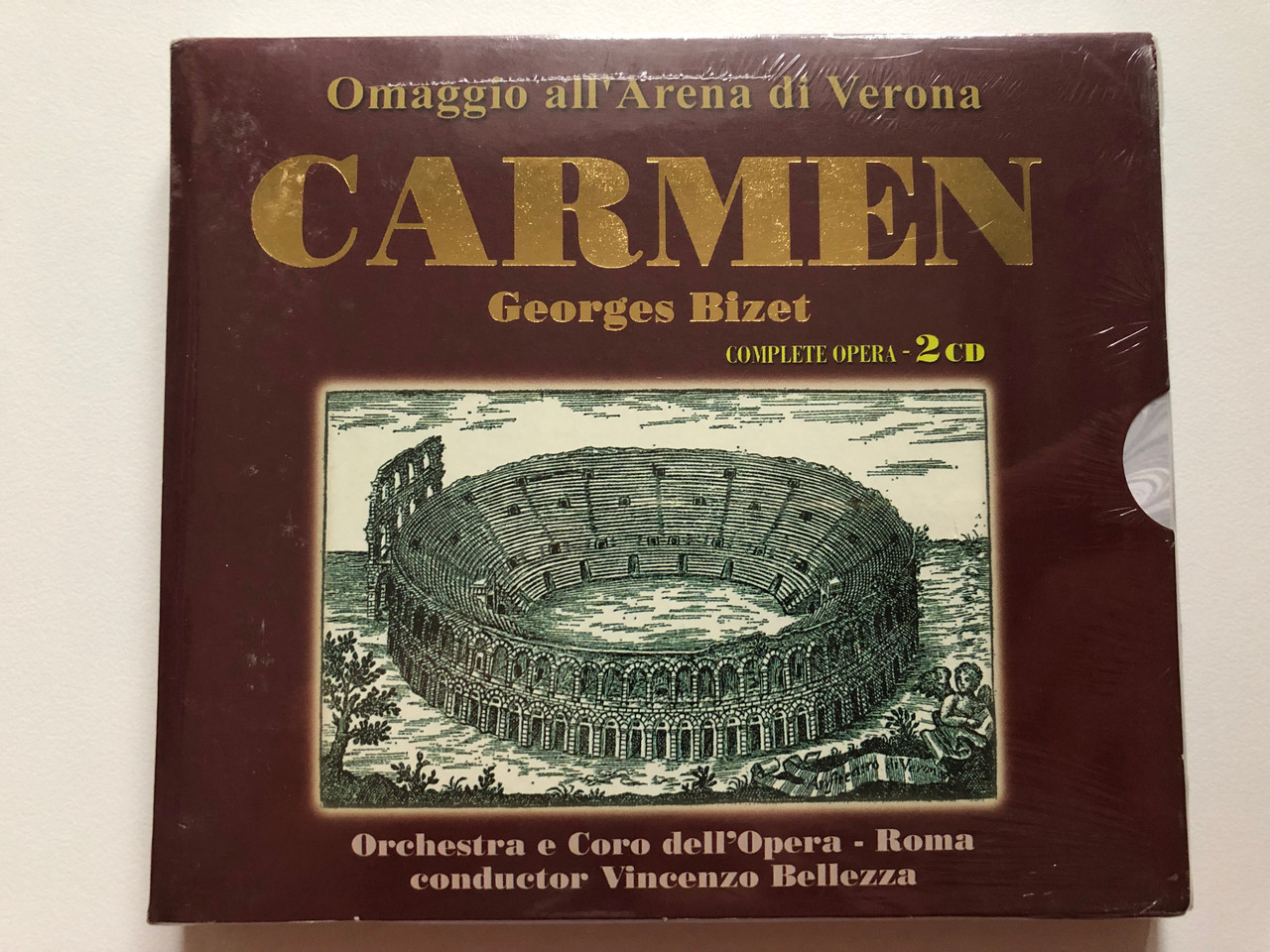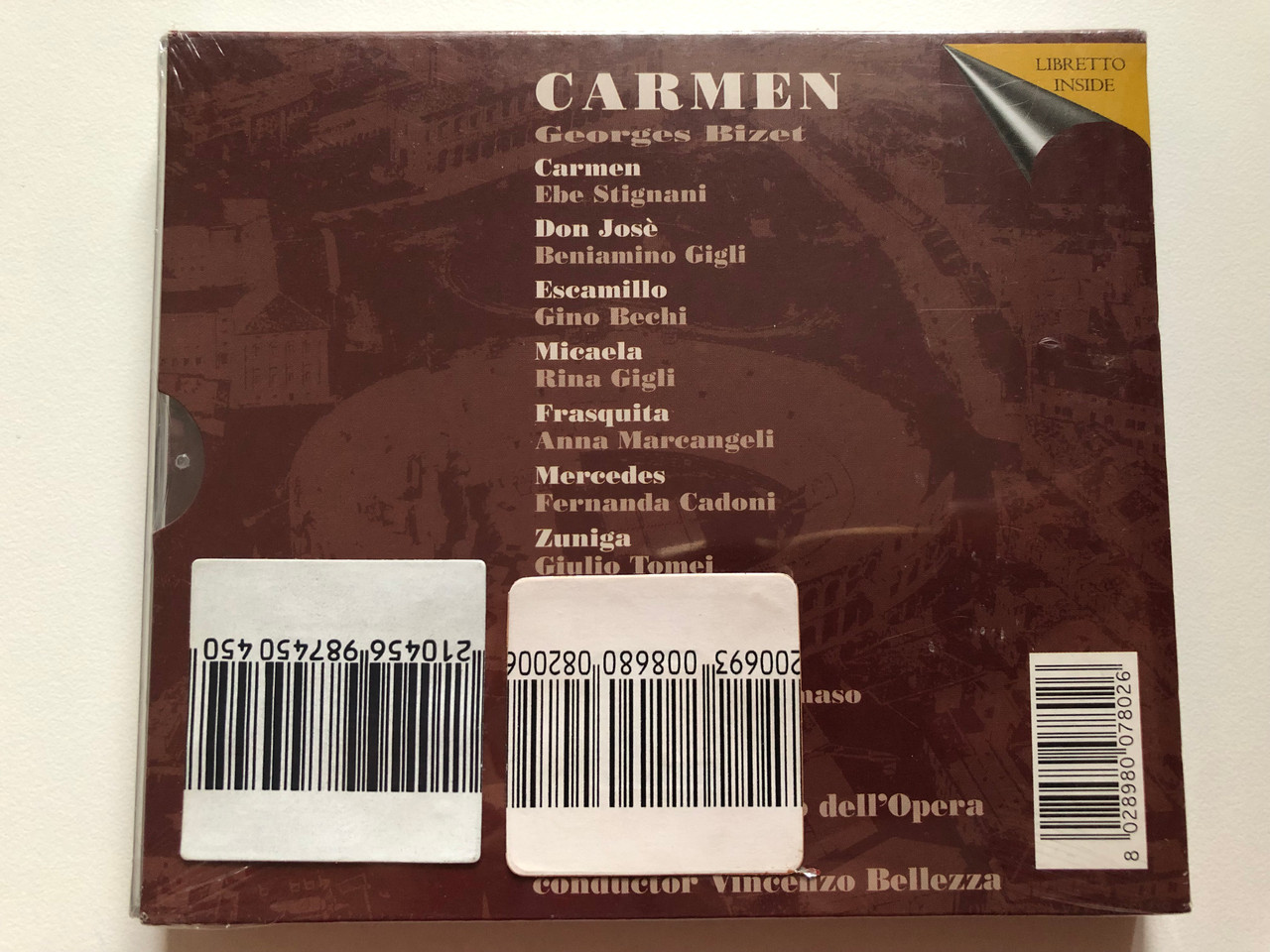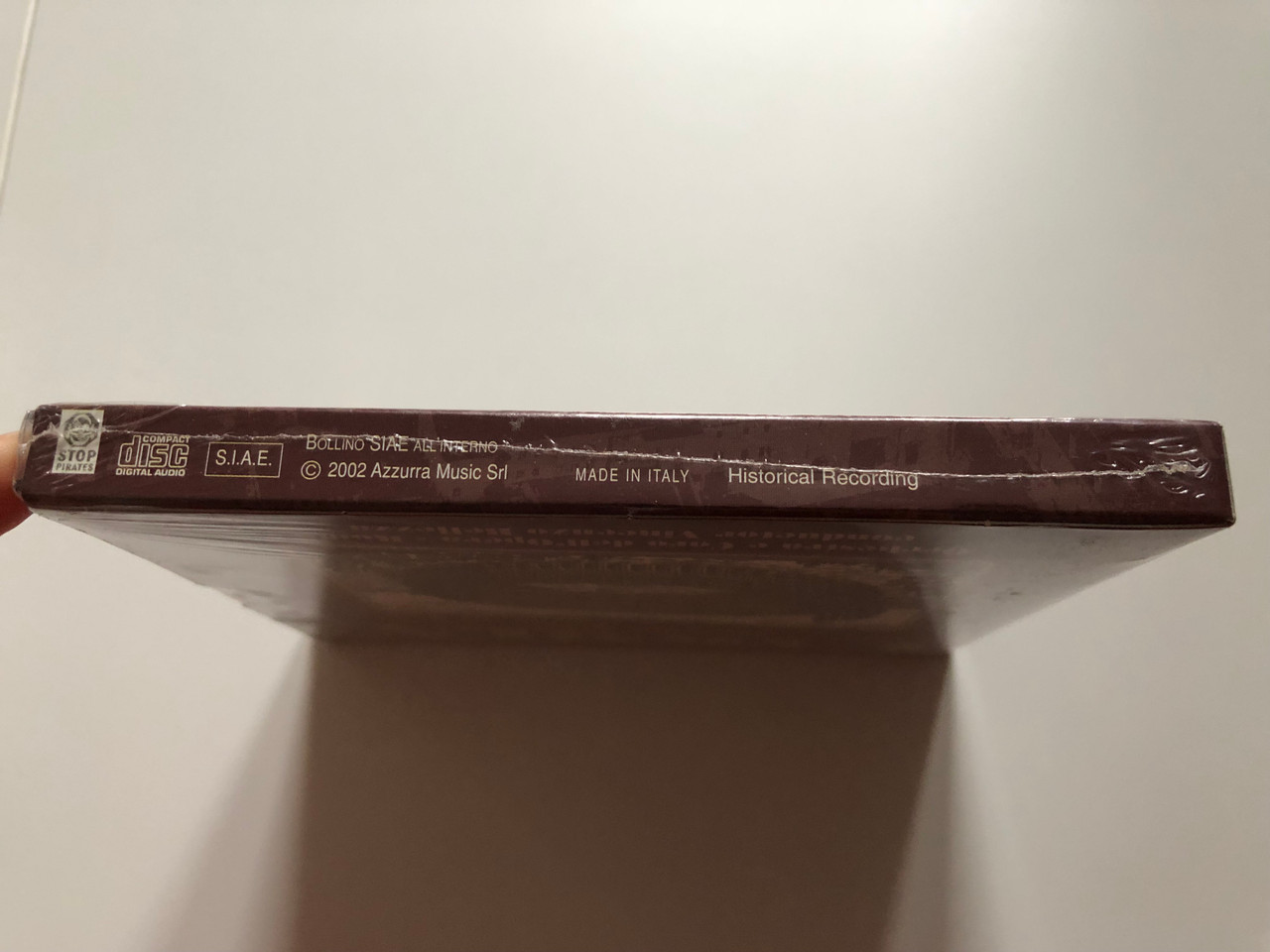Description
Omaggio all' Arena di Verona - Carmen - Georges Bizet / Orchestra E Coro Dell'Opera - Roma, Vincenzo Bellezza / Azzurra Music 2x Audio CD 2002 / GI121/2
UPC 8028980078026
Carmen (French: [kaʁ.mɛn]) is an opera in four acts by French composer Georges Bizet. The libretto was written by Henri Meilhac and Ludovic Halévy, based on the novella of the same title by Prosper Mérimée. The opera was first performed by the Opéra-Comique in Paris on 3 March 1875, where its breaking of conventions shocked and scandalized its first audiences.
Bizet died suddenly after the 33rd performance, unaware that the work would achieve international acclaim within the following ten years. Carmen has since become one of the most popular and frequently performed operas in the classical canon; the "Habanera" from act 1 and the "Toreador Song" from act 2 are among the best known of all operatic arias.
The opera is written in the genre of opéra comique with musical numbers separated by dialogue. It is set in southern Spain and tells the story of the downfall of Don José, a naïve soldier who is seduced by the wiles of the fiery gypsy Carmen. José abandons his childhood sweetheart and deserts from his military duties, yet loses Carmen's love to the glamorous torero Escamillo, after which José kills her in a jealous rage. The depictions of proletarian life, immorality, and lawlessness, and the tragic death of the main character on stage, broke new ground in French opera and were highly controversial.
After the premiere, most reviews were critical, and the French public was generally indifferent. Carmen initially gained its reputation through a series of productions outside France, and was not revived in Paris until 1883. Thereafter, it rapidly acquired popularity at home and abroad. Later commentators have asserted that Carmen forms the bridge between the tradition of opéra comique and the realism or verismo that characterised late 19th-century Italian opera.
The music of Carmen has since been widely acclaimed for brilliance of melody, harmony, atmosphere, and orchestration, and for the skill with which Bizet musically represented the emotions and suffering of his characters. After the composer's death, the score was subject to significant amendment, including the introduction of recitative in place of the original dialogue; there is no standard edition of the opera, and different views exist as to what versions best express Bizet's intentions. The opera has been recorded many times since the first acoustical recording in 1908, and the story has been the subject of many screen and stage adaptations.
| Label: | Azzurra Music – GI121/2 |
|---|---|
| Format: |
2 x CD
|
| Country: | Italy |
| Released: |
2002 |
| Genre: | Classical |
| Style: | Opera |
Tracklist:
| 1-1 | Prelude | |
| 1-2 | Attio I: Sulla Piazza Si Schiamazza | |
| 1-3 | Attio I: Con la Guardia Quando Monta | |
| 1-4 | Attio I: Una Fanciulla Avvenente | |
| 1-5 | Attio I: Suonò la Campana, E Delle Operaie | |
| 1-6 | Atto I: Ma Fra Voi Non è La Carmencita | |
| 1-7 | Atto I: È L' Amore Uno Strano Augello | |
| 1-8 | Atto I: Carmen, Tutti Qui Te Sola Aspettiam | |
| 1-9 | Atto I: Quale Occhiata E Qual'aria Sfrontata! | |
| 1-10 |
Atto I: Resta Qui Mio Tesor! | |
| 1-11 | Atto I: Che Avvenne Mai? Che C' è? | |
| 1-12 | Atto I: Mio Capitan, è Stata Una Baruffa | |
| 1-13 | Atto I: Presso IL Bastion Di Siviglia | |
| 1-14 | Atto I: Ecco L'ordin, T`en Va | |
| 1-15 | Atto I: Entr´acte | |
| 1-16 | Atto II (parte prima): All`udir Del Sistro IL Suon | |
| 1-17 | Atto II (parte prima): Or Ben Pastia Desia | |
| 1-18 | Atto II (parte prima): Con Voi Ber, Affe, MI Fia Caro | |
| 1-19 | Atto II (parte prima): Ebben, Dite, Abbiam Novelle ? | |
| 1-20 | Atto II (parte prima): E Chi Puoi Tu Aspettar ? ... Alto Là ! Chi Va Là ? | |
| 1-21 | Atto II (parte prima): La, La, La, La, La, La | |
| 2-1 | Atto II (parte seconda): IL Fior Che Avevi A Me Tu Dato | |
| 2-2 | Atto II (parte seconda): No, Tu Non M' Ami No | |
| 2-3 | Atto II (parte seconda): Ola! Carmen! Ola! Ola! | |
| 2-4 | Atto II (parte seconda): Bel Capitan, Bel Capitan | |
| 2-5 | Atto II (parte seconda): Entr´acte | |
| 2-6 | Atto III: Ascolta, Ascolta Camerata Ascolta | |
| 2-7 | Atto III: CI Riposiam Brev`ora Qui, La Notte è Bruna | |
| 2-8 | Atto III: Mischia! Mischia!... Alza! Alza! | |
| 2-9 | Atto III: Andiam, La Nostra Sorte Sappiam! | |
| 2-10 | Atto III: È Nostro Affar IL Doganier | |
| 2-11 | Atto III: Qui Dei Contrabbandier... Io Dico, No, Non Son Paurosa | |
| 2-12 | Atto III: Ma Non M`inganno | |
| 2-13 | Atto III: Ho Nome Escamillo, Toreador Di Granada | |
| 2-14 | Atto III: Ola! Ola! Josè | |
| 2-15 | Atto III: Alto ! V' è Là Qualcun | |
| 2-16 | Atto III: Entr´acte | |
| 2-17 | Atto IV: Per Due Quarti, Chi Ne Vuole? | |
| 2-18 | Atto IV: Son Qui, Son Qui, Ce N`ho | |
| 2-19 | Atto IV: Se Tu M`ami Mio Ben | |
| 2-20 | Atto IV: O Carmen, Un Buon Consiglio | |
| 2-21 | Atto IV: Sei Tu?... Son Io |
- Baritone Vocals – Gino Bechi, Guido Mazzini
- Bass Vocals – Giulio Tomei
- Chorus – Coro dell'Opera - Roma
- Composed By – Georges Bizet
- Conductor – Vincenzo Bellezza
- Mezzo-soprano Vocals – Anna Marcangeli, Ebe Stignani
- Orchestra – Orchestra dell'Opera - Roma
- Soprano Vocals – Rina Gigli
- Tenor Vocals – Arturo La Porta, Beniamino Gigli, S. De Tomasso




























